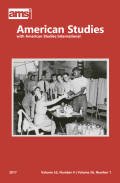Abstract
This essay challenges the common conflation of “anarchism” with “violence” and/or “terrorism” by demonstrating that anarchists’ stances toward violence were neither simple nor uniform. Focusing on the height of American anarchism—from the 1880s to the 1910s—it explores both instances of anarchist violence and efforts to theorize violence’s role in order to posit a far more complex relationship amongst American government, anti-government politics, and the specter of violence. By addressing the much-debated and perhaps misleadingly named theory of “propaganda by deed”—a construction that itself suggests a tension between words (propaganda) and actions (deeds)—the essay details a widespread anarchist ambivalence toward violence: a distance between the rhetoric of violence and the need to respond to actual moments of violence. The presence of this ambivalence offers first, a revised approach to the question of anarchist violence and second, a provocative model for considering the structural power of U.S. representative democracy. This essay contends the ambivalence reveals the central paradox of the period’s anti-government politics: to challenge democracy’s defining representational logic, anarchists needed to transform their politics—even those acts that questioned the nation’s reliance on representation as the proper form of government—into representation. Ultimately, the essay argues the period’s strong reliance on representation—both as a form of government and as a model for political participation—produced the anarchist ambivalence by excluding certain visions for social transformation.
All items © Mid-America American Studies Association
Authors: If you prefer to remove your text(s) from this database please contact the editor.

